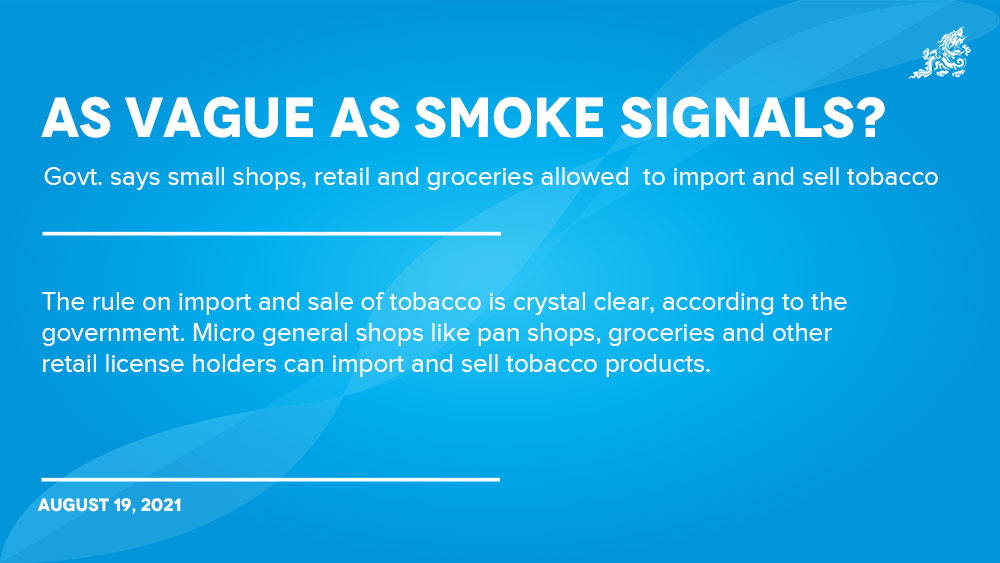Govt. says small shops, retail and groceries allowed to import and sell tobacco
Younten Tshedup
The rule on import and sale of tobacco is crystal clear, according to the government. Micro general shops like pan shops, groceries and other retail license holders can import and sell tobacco products.
It may not be happening because of the restrictions on import of all goods as import is strictly regulated in the wake of the pandemic. But if those interested can import and sell, it is allowed.
The ministry of economic affairs, in a notification on August 5, laid down a few new interim arrangements, clarifying on the import, sale and buying of tobacco and tobacco products in light of the revised Tobacco Control Act.
The new Tobacco Control Act came into effect from July 2. On the ground, there are several issues regarding the implementation of the Act. As of yesterday, most shops in Thimphu, involved in the tobacco business, were not aware that they could import tobacco products for sale. Many of them were still buying tobacco and tobacco products from the black market dealers.
No tobacco
The Bhutan Duty Free Ltd (BDFL), for now, remains the ‘go-to’ point for all tobacco related products in the country.
A pan shop operator in Thimphu, Wangmo, said that the BDFL has set a limit to tobacco products that are made available from the duty-free outlet. “We are given only five gum (a gum contains 200 sticks of cigarettes) of cigarettes once every two weeks. This hardly lasts us three days. For the remaining 11 days, we have to resort to the black market.”
Officials from the BDFL said that given the limited supply of tobacco products, they had to ration the products so that everyone got their share.
An official from the state owned enterprise said that BDFL has been tasked to supply tobacco products to meet the demand. BDFL was asked to exhaust all its existing tobacco products and make them available for consumers. However, with not many private importers, BDFL continues to import tobacco and tobacco products and distribute them in the market today.
“As demand continues to grow, there is a huge pressure on us,” said the official. “Once private dealers and retailers start importing, the pressure on us would decrease and the price would also drop.”
Under the revised Tobacco Control Act, sale, import, distribution, buying, possessing, and transportation of tobacco and tobacco products are allowed. However, many are still unaware as to how and when these new terms would apply.
Customs and trade officials including police personnel along the border are still unaware that people can now import tobacco and tobacco products legally.
The government will not visit every pan shop or grocery to inform that sale or import of tobacco is allowed. But there is confusion surrounding the import or sale of tobacco. “The revised Act is clear — sale, import, buying, and possessing tobacco products is now legal. It has been endorsed by the Parliament but apparently, the regulators seem to be lost,” said one.
Black market not in the black
With the borders sealed and incoming goods thoroughly inspected and screened, the availability of tobacco products in the market today indicates the existence of some loopholes.
According to sources, despite the ‘almost-water-tight’ surveillance system put in place, smugglers succeeded in bringing illegal tobacco products into the country. This, however, they say would decrease in the coming days with the allowing of the import of tobacco products.
Frustrated by the exorbitant black market rate, some are even suspecting if the BDFL is keeping the black market alive, as they remain the only importer of tobacco and tobacco products in the country.
Pan shop operators allege that people dealing with the tobacco products in BDFL ‘secretly’ supply tobacco over and above the limit to certain individuals who then sell them in the black market.
“The limited quantity within our quota lasts no longer than three days. The next quota is distributed only at the end of two weeks. So, within these 11 days, we have to buy from the black market at a higher price,” said a shop owner. “There is a certain level of lifestyle change in people who are involved in this kind of trade in duty-free. And there is only one explanation to this change, illegal business.”
BDFL officials said that there were no complaints of BDFL employees engaging in the illegal market. An official said that the company was tasked to make tobacco and tobacco products available to all consumers at a cheaper rate, which the office was diligently carrying out despite all the challenges it faced.
BDFL has started distributing tobacco and tobacco products across the country. So far it has covered Paro, Haa, Gasa, Wangdue, Punakha, Bumthang, Trongsa, and Mongar.
Many also blame hoarding of tobacco as there is a limit set to the current distribution from the BDFL outlets. Some (mostly non-smokers) are said to collect tobacco products and sell them in the black market at a higher price.
BDFL’s daily sale of tobacco products is around Nu 1.72 million (M) on an average today. The sales hovered over Nu 1.39M before the tax revision.
This indicates that tobacco products worth Nu 1.72M are distributed in the market every day. However, many doubt that millions worth of tobacco sales everyday might not translate to the consumption level, hinting that people buy from the outlet everyday to hoard and sell it later in the black market.
“Because the duty free quantity is not enough for the shops, they will have to rely on the black market anyway,” said one. “But this too is expected to fade once people start importing and the market has enough legal suppliers.”


